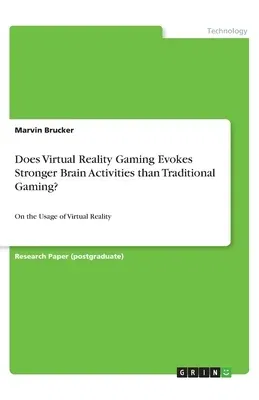Research Paper (postgraduate) from the year 2018 in the subject
Engineering - Computer Engineering, grade: 1,3, Xi'an Jiaotong-Liverpool
University, language: English, abstract: This paper evaluates whether
virtual reality gaming evokes different brain activities than
traditional gaming and how significant these differences are. Virtual
reality influences an increasing number of areas in our daily
entertainment life and reaches millions of people world-wide. While the
underlying technology isn't completely new, its wide distribution as a
consumer market device on the other hand is a new and ongoing trend. One
of the main fields of ap-plication for the modern virtual reality
devices is the gaming domain. But besides an incredibly high degree of
realism, players also report about dizziness, exhaustion and
intoler-ances of this new way of gaming. To what extent virtual reality
gaming has a different impact on the gamer than traditional gaming is
highly relevant for different target groups. Since this combination of
virtual reality devices and gaming, which experiences a growing
significance from a commercial and user-oriented point of view, has not
been given much attention from a research perspective yet, the impact of
virtual reality gaming on the user will be subject of this paper. More
specifically, this paper evaluates whether virtual reality gaming evokes
stronger brain activities than traditional gaming and how significant
these are. The paper is structured as follows. Based on the background,
the problem statement and the resulting motivation of this paper will be
illustrated in detail. The subsequent chapters will describe the
experiment's methodology, its procedure and the collected data with a
following analysis and interpretation. Furthermore, the author will use
the collected results and their respective interpretations to suggest
future research.


